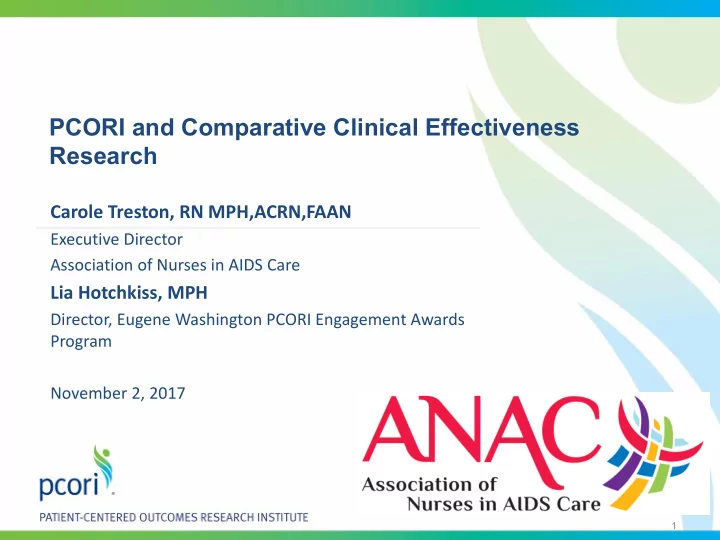

PCORI and Comparative Clinical Effectiveness Research Carole Treston, RN MPH,ACRN,FAAN Executive Director Association of Nurses in AIDS Care Lia Hotchkiss, MPH Director, Eugene Washington PCORI Engagement Awards Program November 2, 2017 1
Disclosures Carole Treston is a volunteer PCORI Ambassador and an appointed member of a PCORI Clinical Trials Advisory Panel. Lee Hotchkiss is an employee of PCORI. This session is part of a PCORI engagement & dissemination award to ANAC.
Agenda • Overview of PCORI and Comparative Effectiveness Research ` • Connection to nursing research and HIV Patient Centered Care • What makes a successful PCORI proposal • Examples of PCORI funded research • Questions & Discussions
Learning Objectives At the conclusion of this session participants will be able to: • Describe PCORI approach to comparative clinical research • Identify the relationship between patient centered care and comparative clinical research • Discuss examples of PCORI funded research that are relevant to nurses and other HIV providers and people living with HIV.
Patient Centered Outcomes Research Institute • An independent research institute authorized by Congress in 2010 and governed by a 21-member Board of Governors representing the entire healthcare community • Funds comparative clinical effectiveness research (CER) that engages patients and other stakeholders throughout the research process • Seeks answers to real-world questions about what works best for patients based on their circumstances and concerns
PCORI Funds Comparative Clinical Effectiveness Research • Generates and synthesizes evidence comparing benefits and harms of at least two different methods to prevent, diagnose, treat, and monitor a clinical condition or improve care delivery • Measures benefits in real-world populations • Describes results in subgroups of people • Helps consumers, clinicians, purchasers, and policy makers make informed decisions that will improve care for individuals and populations • Informs a specific clinical or policy decision Note: PCORI does not fund cost-effectiveness research Adapted from Initial National Priorities for Comparative Effectiveness Research , Institute of Medicine of the National Academies
Why Is PCORI Needed? • For all the advances it produces, traditional healthcare research has not answered many questions patients face. • People want to know which preventive, diagnostic, or treatment option is best for them. • Patients and their clinicians need information they can understand and use.
How Is PCORI Different? • PCORI funds research on which care options work, for whom, under which circumstances. • PCORI focuses on answering questions most important to patients and those who care for them. • PCORI engages patients, caregivers, clinicians, insurers, employers, and other stakeholders throughout the research process. • PCORI’s intended outcome is useful study results easily translated and taken up in practice. 8
PCORI Mission and Strategic Goals PCORI helps people make informed healthcare decisions, and improves healthcare delivery and outcomes, by producing and promoting high- integrity, evidence-based information that comes from research guided by patients, caregivers, and the broader healthcare community. PCORI Strategic Goals: Increase quantity, quality, and timeliness of useful, trustworthy research information available to support health decisions Speed the implementation and use of patient-centered outcomes research evidence Influence research funded by others to be more patient-centered
Who Are PCORI Stakeholders? Caregivers/Family Members Clinicians Payers Purchasers Policy Makers Patients/Consumers Industry Hospitals/Health Systems Training Institutions Patient/Caregiver Advocacy Organizations
How PCORI Engages Stakeholders Merit Review Advisory Panels Panels Speakers Bureau Pipeline to Proposal Awards Webinars and Engagement Awards Workshops Ambassadors
PCORI Funds Patient-Centered Outcomes Research PCOR is a relatively new form of CER that…. • Considers patients’ needs and preferences, and the outcomes most important to them • Investigates what works, for whom, under what circumstances • Helps patients and other healthcare stakeholders make better-informed decisions about health and healthcare options
PCORI National Priorities for Research Assessment of Prevention, Research that: Diagnosis, and Treatment • Compares the Options effectiveness and safety of alternative prevention, diagnosis, and treatment options • Determines which ones work best for different people with a particular health problem
PCORI National Priorities for Research Research that: Assessment of Prevention, Diagnosis, and Treatment • Compares health Options system–level approaches to Improving Healthcare Systems improving access • Supports patient self- care, innovative use of health information technology, care coordination for complex conditions, and effective workforce deployment
PCORI National Priorities for Research Assessment of Prevention, Research on: Diagnosis, and Treatment • Providing information Options produced by CER Improving Healthcare Systems • Empowering people to ask for and use the information Communication and • Supporting shared Dissemination Research decision making between patients and their providers
PCORI National Priorities for Research Assessment of Prevention, Research on: Diagnosis, and Treatment • Prevention, diagnosis, or Options treatment effectiveness • Preferred clinical Improving Healthcare Systems outcomes across patient populations Communication and • Health care required to Dissemination Research achieve best outcomes in each population Addressing Disparities
PCORI National Priorities for Research Assessment of Prevention, Research on: Diagnosis, and Treatment • Building data Options infrastructure • Improving analytic Improving Healthcare Systems methods • Training researchers, Communication and patients, and other Dissemination Research stakeholders to participate in this research Addressing Disparities Accelerating Patient-Centered Outcomes Research and Methodological Research
Engagement Award Overview (updated June 1, 2017) Engagement Award (EA) projects will: § Equip patients and other stakeholders to engage as meaningful partners in PCOR/CER from topic selection to dissemination or implementation of results; and/or Awards of up to § Support organizations to lay groundwork $250,000 per project, for disseminating and implementing research up to two years in results or products derived from PCORI duration Funding through an Engagement Award Initiative Notice (EAIN) supports meetings/conferences that align with PCORI’s mission and strategic plan, and facilitate expansion of PCOR/CER in areas such as: § research design and methodology Awards of up to $50,000 § research development per conference, up to one year in § dissemination and implementation duration 18
Recommend
More recommend